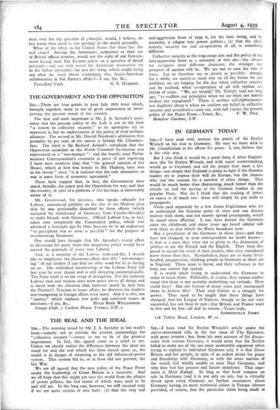THE REAL AND THE IDEAL
SIR,—The warning raised by Mr. J. A. Spender in last week's issue—namely, not to mistake the present partnerships for " collective security "—seems to me to be of the greatest importance. In fact, this appeal came as a relief to me. Unless we clearly realise the difference between the ideal we stand for and the real which has been forced upon us, the world is in danger of returning to the old balance-of-power system. This system led to, or at least did not prevent, the last War.
We are all agreed that the new policy of the Peace Front under the leadership of Great Britain is a necessity. And we all hope that this might yet save the world from the plague of power politics, the last resort of which wars used to be and still are. In the long run, however, we will succeed only if we are quite certain of two facts : (I) that the very real anti-aggression front of 1939 is, for the time being, and by necessity, a relapse into power politics ; (2) that the ideal, namely, security for and co-operation of all, is something different.
Collective security as the long-range aim and the policy of the anti-aggression front as a necessity of this day—the dearer we recognise their different character, the stronger our prospect of success will be. We are out to oust the rule of force. Let us therefore say as clearly as possible: though, for a while, we ourselves must rely on all the forces we can mobilise, we are longing for the day when collective security can be realised, when co-operation of all will replace co- ercion of some. "We are bound," Dr. Temple said not long ago, " to reaffirm our principles when we see them not merely broken but repudiated." There is neither self-righteousness nor duplicity about it when we confirm our belief in collective security and nevertheless carry out, with full vigour, the present
policy of the Peace Front.—Yours, &c., F. W. PICK. Beaufort Gardens, S.W.








































 Previous page
Previous page